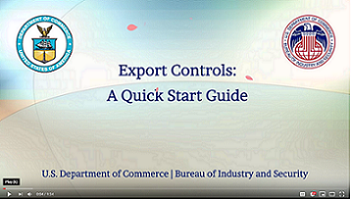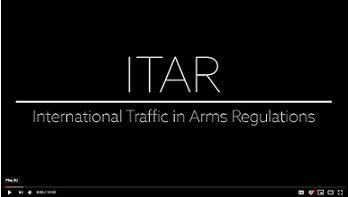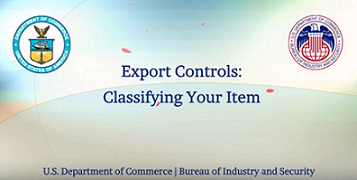Compliance
No matter what product or service you produce, it is subject to US government export control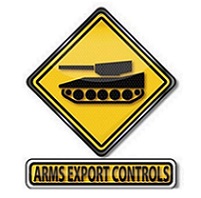 laws and regulations when it leaves the country. These regulations, put in place for reasons of national security, dictate the ability of a company to sell their product based on the end destination (country), the end buyer, and the end use of the product. Fortunately, about 95% of products and services should be able to flow through international borders without an export license but you must still be aware of prohibited end users and end destinations. I would also like to take a moment and call out that training, technical data, or information over the phone given to someone from a different country, even a student, can be considered an export and are known as “deemed exports”. The following information will assist you with putting a standardized export compliance program in place as part of your normal due process in a sale.
laws and regulations when it leaves the country. These regulations, put in place for reasons of national security, dictate the ability of a company to sell their product based on the end destination (country), the end buyer, and the end use of the product. Fortunately, about 95% of products and services should be able to flow through international borders without an export license but you must still be aware of prohibited end users and end destinations. I would also like to take a moment and call out that training, technical data, or information over the phone given to someone from a different country, even a student, can be considered an export and are known as “deemed exports”. The following information will assist you with putting a standardized export compliance program in place as part of your normal due process in a sale.
Do I need a license to export my product?
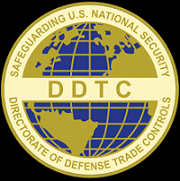 There are two main bodies of law that govern export licenses- the International Traffic in Arms Regulations (ITAR) administered by the Directorate of Defense Controls in the Department of State and the Export Administration Regulations (EAR) administered by the Bureau of Industry and Security in the Department of Commerce.
There are two main bodies of law that govern export licenses- the International Traffic in Arms Regulations (ITAR) administered by the Directorate of Defense Controls in the Department of State and the Export Administration Regulations (EAR) administered by the Bureau of Industry and Security in the Department of Commerce.
The ITAR governs any product or service that is related to the defense industry (i.e. many types of firearms and ammunitions, tanks, explosives, guidance systems, etc.). Most companies will not fall into this category but, if you do, you will certainly need a license and can skip to “I do need a license.”
The EAR governs any product that is considered “dual-use” or can be used in both commercial and military applications (i.e. chemicals, microorganisms, electronics, computers, sensors, etc.) but also has a catch all category for any product that is not subject to export licensing. It is in this designation, also known as “EAR99”, that 95% of all products fall.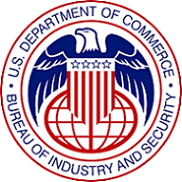
In order to determine where your product lands, we must look at EAR’s Commerce Control List (CCL). If your product is on this list, it will be given an Export Control Classification Number (ECCN) that will dictate what situations why it is controlled and in what situations it will need a license. If your product is not on the CCL, it will be designated as EAR99. If you are EAR99, you will still need to pay attention to end-use, end-user, and end-destination.
I want to read about it
Here are three guides published by the Bureau of Industry and Security on the structure of the EAR and how to find your ECCN.
Here is the Commerce Control List which will help you determine your ECCN. If you are not on this list, and not subject to ITAR, then your good is EAR 99. You may either self classify or, if you are unsure and would like an official ruling, also known as a Commodity Jurisdiction Request, you can request this from BIS at the second link below.
I want to watch a video about it
Here is an introductory video put out by the Bureau of Industry and Security on determining the licensing requirements for your product if it falls into the jurisdiction of the EAR.
I want to talk to a person about it
I don't need a license but I still would like to check to see if an end user or end destination are prohibited.
No matter the designation of your product, there are still laws that prohibit specific end-uses (i.e. the development of nuclear weapons, etc.), prohibited end-users (i.e. known terrorists, denied persons, etc.), and end-destination (i.e. embargoed or sanctioned countries). These lists, known as the “Lists to Check” are housed under the Department of Commerce, Department of State, and the Department of Treasury. You can find all of the sources listed at the below link but, for convenience, the US Commercial Services also put out a consolidated screening list that will allow you to search all of the lists simultaneously. This is known as the Consolidated Screening List and can also be found below.
I do need a license. What are my next steps?
If you need a license, you fall under one of two categories- International Traffic in Arms Regulations (ITAR) for defense-based products and services or the Export Administration Regulations (EAR) for all dual-use products. Follow the decision tree to determines what licenses you will need and the resources available to assist in setting up your export compliance program. If at any point you would rather talk to someone than wade through this, just click this link to reach our office.
I'd like to talk to a person about it
International Traffic in Arms (ITAR) License
International Traffic in Arms (ITAR) License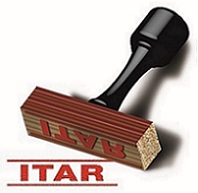 The Directorate of Defense Trade Controls (DDTC) under the U.S. Department of State is responsible for the export and temporary import of defense related articles and services. These products are listed in the United States Munitions List (USML). You will need to start here to see if your good is subject to ITAR. If it is, you will need to register with DDTC and will need to put an export compliance system in place for all exports.
The Directorate of Defense Trade Controls (DDTC) under the U.S. Department of State is responsible for the export and temporary import of defense related articles and services. These products are listed in the United States Munitions List (USML). You will need to start here to see if your good is subject to ITAR. If it is, you will need to register with DDTC and will need to put an export compliance system in place for all exports.
If it is not subject to ITAR, return the Export Administration Regulations (EAR) to see where your good falls.
No matter the designation of your product, there are still laws that prohibit specific end-uses (i.e. the development of nuclear weapons, etc.), prohibited end-users (i.e. known terrorists, denied persons, etc.), and end-destination (i.e. embargoed or sanctioned countries). These lists, known as the “Lists to Check” are housed under the Department of Commerce, Department of State, and the Department of Treasury. You can find all of the sources listed at the below link but, for convenience, the US Commercial Services also put out a consolidated screening list that will allow you to search all of the lists simultaneously. This is known as the Consolidated Screening List and can also be found below.
I'd like to read about it
Here is a link to the ITAR regulations in full text.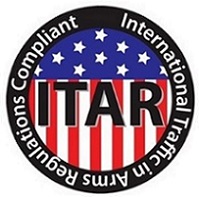
Here is a link to the United States Munitions List. This list is where you will need to self-classify your good. If you are not quite sure, you may peruse the “advisory opinions” on the DDTC website for previous questions asked or request “commodity jurisdiction” which is an official ruling from the DDTC. These rulings can take 6-8 weeks.
Another helpful resource is this searchable ITAR database that can be helpful in narrowing down where your product will be listed in the ITAR.
I want to watch a video about it
This video, put out by the US Export Academy, will give you a good over view of ITAR and steps for compliance with the regulations in about 10 minutes.
I'd like to talk to a person about it
Export Administration Regulations (EAR) License
I'd like to read about it
The Bureau of Industry and Security has put together several brochures that will assist you in how to classify your product under the EAR.
Once classified, you will then need to move on to the second step of finding your Export Control Classification Number (ECCN). This number will tell you why your product is controlled and in what situations you will need a license. These licenses are free and, depending on the product as well as the country you are shipping to, you may also be able to obtain a license exception. Once you know the reasons for control and when a license is needed, you will be able to put together a compliance program.
I'd like to watch a video about it
Here is a link to many useful tools in an online training room that will help you classify your product and put together a compliance program.
I'd like to talk to a person about it
